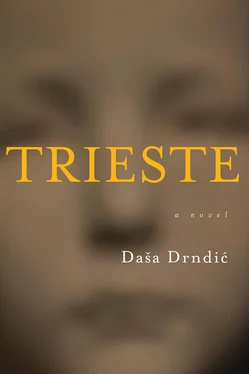She has no idea what her ancestors looked like. There is no proof. Nothing remains.


Her family rattle on the bottom of the trough (of her memory). Today the limbs, her family’s branches, are so jumbled, so dislocated, it is impossible to settle on their whereabouts. The organs of her family are strewn all over. The lives of her ancestors matter less and less for her story, however, for her wait.
Her grandfather was born in Görz. Her mother was born in Görz. She was born in Gorizia/Gorica. When the Great War broke out, they began moving, living in many places. She doesn’t know what Görz was, nor does she know what Gorizia is now though she has been here nearly sixty years. She takes walks along Gorizia’s streets, but hers are brief forays, quick walks, walks with a purpose, jaunts. Even when she takes longer strolls, when her strolls are more leisurely (when the days are mild and her room feels stale, a humid inertia), Haya doesn’t notice the big changes in her surroundings. She feels as if she has been sitting for sixty years in a shrinking room, a room whose walls are moving slowly inward to meet at a miniature surface, a line, at the apex of which she sits, crushed. She cannot see, nor is she watching. She has wax plugs in her ears. She does not hear. Görz, Gorizia, are memories. She isn’t certain whose memories they are. Hers or her family’s. Maybe they are fresh memories. When she goes out she squints at the sun, picks daisies, sits at the Joy Café and smokes. She has not let herself go. She does not wear black. She is not forever rocking back and forth. All is as it should be. She has a television. She has little memories, darting memories, fragmented. She sways on the threads of the past. On the threads of history. She swings on a spider’s web. She is very light. Around her, in her, now is quiet. Gorizia has a history, she has a history. The days are so old.
Sometimes she dreams
she is dragging her mother in a plastic sack. she is dragging her by the legs. she wants to hide her. one of her mother’s legs snaps off. her mother is dead, but she says, hide that leg, bury it near the stationery shop at the intersection of seminario and ascoli; take the rest to rose valley, that is what she says
Her grandfather, grandmother and mother are born as subjects of the Habsburg Monarchy to which their ancestors came long before, from Spain, she thinks. She is born in Italy. They speak German, Italian and Slovenian, mostly Italian. Grandmother Marisa was a Slovene, as was her great-grandmother, Marija. Both died young. Her family did not mix much with others in terms of race and nationality, yet they became mixed. Today all her ancestors are jumbled, impossible to disentangle.
An oft-thumbed family booklet, a guidebook of sorts from 1780 that Haya Tedeschi keeps on the desk by the window with a dozen old volumes and several pamphlets, says that Görz or Goritz is an ancient city on the banks of the River Lizono, situated in Gorizia, in a small province by the name of Friuli, a possession of the House of Austria. Sovereignty over the Gorizia Habsburgs is lost between 1508 and 1509 when the Venetians rule the town, building it into a fortification, only to lose it during the Napoleonic Wars, when it becomes part of the Illyrian provinces. The castle (1780) still dominates Gorizia. In the second half of the eighteenth century, the guidebook says, a synagogue was built there, suggesting the influx of a colourful community. Gorizia lies about thirty kilometres to the north of Aquileia and, according to the guidebook, some seventy kilometres north of Venice. The town of Gorizia is in a wooded area, not far from a road that ran, in Roman times, from Aquileia to Emona. The name of the town appears first in a document dated 28 April, 1001 (“quae sclavonica lingua vocatur Goritia”), with which Emperor Otto III makes a gift of the fort and settlement to Patriarch Giovanni II and Verihen Eppenstein, the Count of Friuli. Today, the guidebook says, Gorizia is an archbishopric with jurisdiction over the bishoprics of Trieste, Trento, Como and Pedena.
Her grandfather Bruno Baar fights in the Austrian Army during World War One. His half-brother Roberto Golombek, a student in Vienna at the time, opens a dentistry office there at Weinberggasse 16 in 1924. Roberto moves to Great Britain in 1939 and gets a job at a sardine factory, so that between 1943 and 1945 the Baar family, while still living at Via Favetti 13 in Gorizia, is supplied, who knows how, with vast quantities of salted sardines, thanks to which they survive the bleakest years of World War Two.
As of May 1915, Italy is no longer neutral. It has not been granted Trentino, the Southern Tyrol and Istria by Austria-Hungary, which it had demanded in return for staying on the sidelines. Rarely does war leave anyone on the sidelines. Hence, affronted, Italy conducts secret talks with the Triple Entente, after which it crosses over and joins them. Invariably there are conflicting sides in any war. The Great War was a conflict between two sides led by the selfsame purpose. To conquer the world. For themselves. For one side. When it enters the war on the side of the Triple Entente, Italy asks again for: Trentino, Trieste, the Slovenian coastline, Istria, a part of Dalmatia and Albania, as well as the right to the Turkish provinces of Adalia and Smyrna, expansion of the colonies in Africa, and so forth. Italy asks for a great deal. What is not granted after World War One, Italy strives to make up for in the next war. Wars are games on a grand scale. Self-indulgent young men move little lead soldiers around on many-coloured maps. They draw in the gains. Then they go to bed. The maps hover in the sky like paper aeroplanes, then settle over cities, fields, mountains and rivers. They cover people, figurines, which the great strategians then shift elsewhere, move here, there, along with their houses and their stupid dreams. The maps of the unbridled military leaders cover what was there, bury the past. When the game is done, the warriors rest. Then historians step up to fashion falsehoods out of the heartless games of those who are never satiated. A new past is written which the new military leaders then draw on to new maps so the game will never end.
Italy joins the Triple Entente. A new front is created — the Italian front. Major battles are fought along the Soča. The Soča flows through Gorica, Gorizia, Görz, Goritz. The Soča, the Isonzo, is a river of a vivid turquoise hue. In its river bed it holds a history which eludes historians. The Soča is a river much like a person. Quiet one moment, raging the next. When it rages, it is mighty. When it is quiet, it sings. The Italians wage four terrible battles in 1915 along the Soča. In the Sixth Battle of the Soča (there are eleven or twelve all told), in 1916, the Italians finally capture Gorizia. They shout Viva! Evviva Italia! The Soča is red. Blinded. The rains tell it, we will heal your wounds. The rains push fiercely into the Soča, like lovers gone wild. The Soča is silent. The muddy and bloodstained waters rise, but the rains do not rinse them clean. On the river bottom roll bones which, like a huge baby’s rattle, disturb its dreams. To this day.
The Soča is a flowing archive of history, a warehouse of wars and love, of legends and myths. It is a coronary artery nourishing the banks. It holds its internal organs in so that they do not spill over. It is a miraculous ray of the cosmos in which endurance shimmers. It is webbed with bridges that summon, like outspread arms, to an embrace. As Ungaretti writes: Questo è l’Isonzo / e qui meglio / mi sono riconosciuto / docile fibre / dell’universo…
Читать дальше














